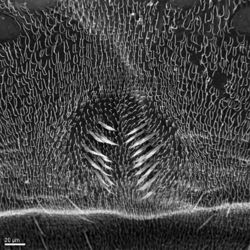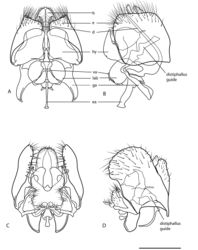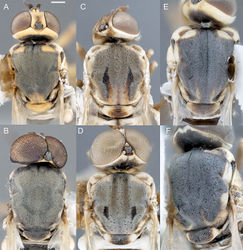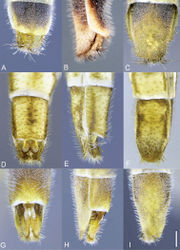Heteromphrale chilensis
| Notice: | This page is derived from the original publication listed below, whose author(s) should always be credited. Further contributors may edit and improve the content of this page and, consequently, need to be credited as well (see page history). Any assessment of factual correctness requires a careful review of the original article as well as of subsequent contributions.
If you are uncertain whether your planned contribution is correct or not, we suggest that you use the associated discussion page instead of editing the page directly. This page should be cited as follows (rationale):
Citation formats to copy and paste
BibTeX: @article{Winterton2011ZooKeys84, RIS/ Endnote: TY - JOUR Wikipedia/ Citizendium: <ref name="Winterton2011ZooKeys84">{{Citation See also the citation download page at the journal. |
Ordo: Diptera
Familia: Scenopinidae
Genus: Heteromphrale
Name
- Heteromphrale chilensis (Kröber) Pensoft Taxon Profile {{#widget:TaxonProfile
|id=Heteromphrale chilensis |height=500
}}
Pseudatrichia chilensis Kröber 1928: 31.
Heteromphrale chilensis (Kröber). – Kröber 1937: 221; Hardy 1966: 2; Kelsey 1969: 286; 1971: 284.Type material
Holotype female, label data: “CHILE Concepción, P. Herbst” / “coll. Lichtwardt” / “Pseudatrichia chilensis det. Kröber” / “HOLOTYPUS”. (DEI) (micropinmounted, reasonable condition except abdomen greasy and antennae missing).
Other material examined
CHILE: Elqui Province: 10 km N La Serena, 10 m, -29°49.27', -71°16.20', 8.X.2003, M.E. Irwin, ex. hand net in coastal dunes [3 males (CASC) (MEI165208, 165209, 165210), 1 female (CASC) (MEI165211), 3 males (CSCA) (MEI165206, 165207 165212)].
Diagnosis
Antennal flagellum orange brown, abruptly pear-shaped; female frons with extensive pile; mouthparts much smaller than oral cavity; scutum with glabrous, glossy dorsocentral spot (linear in female); wing with vein R4 diverging from R5 at point in basal quarter of cell r5; abdomen vivid matte-white with brown suffusion laterally (also medially in female), and with dark brown spot encompassing tergite 2 sensory patch; tergite 2 sensory patch distinct as two small patches; male epandrium not bulbous, without dense fringe of setae; hypandrium lobes sub-triangular with sclerotized lateral margins; distiphallus arms divergent; lateral aedeagal bulbs relatively small; female sternite 8 rounded posteriorly, without fringing elongate setae; acanthophorite spines robust and stout.
Redescription
Body length: 2.6–3.2 mm [male], 4.8 mm [female].
Head (Figs 4C–D, 5C–D). Frons cream-white, female frons with yellow to light brown patch dorsomedially, sometimes more extensive brown-orange suffusion, surface wrinkled, sparsely distributed with small, pale setae; parafacial in male dark orange medially, white along eye margin (in female entirely yellow); ocellar triangle grey pubescent, raised, with anterior ocellus slightly larger than posterior ocellus; occiput and postgena dark with pale yellow with orange-brown suffusion marginally; face white with brown suffusion; mouthparts pale, relatively small in size, much smaller than oral cavity; pale yellow, including labellum, labellar setae, and small cylindrical palpus; prementum in male dark orange (in female pale yellow); flagellum orange-brown, abruptly pyriform, tapered distally; scape and pedicel brown with a few minute pale setae.
Thorax (Figs 5C–D, 7). Scutum light brown to grey, yellow on postpronotal lobe, anterior part of scutum adjacent to postpronotum, notopleuron, supra-alar area and postalar callus (in female, with yellow more extensive in these areas); entire thorax overlain with dense glaucous pubescence; glossy black dorsocentral patches present at point posterior third of scutum, patches round in male, elongate in female, paired median brown vittae in anterior half; scutellum dark medially, pale marginally; prosternum yellow, bare; proepisternum and proepimeron orange (in female yellow); anepisternum orange in dorsal half and along posterior margin (in female yellow), except white along dorsal margin and grey to brown pubescent anteroventrally; katepisternum grey to brown pubescent, except orange in upper part (in female yellow); anepimeron white to yellow, darkened anteriorly; meron shining glossy brown, except white pubescent dorsally; legs pale cream with uniform or mottled brown suffusion, tibiae orange, with dorsal surface pale; hind tibia becoming darker distally; tarsi dark.
Wing. Venation pale brown; vein R4 diverging from R5 at point in basal quarter of cell r5; aberrant specimens with either spurious vein present between distal part of R5 and C (Fig. 7B) or R4 incomplete basally; haltere mostly cream-white.
Abdomen (Fig. 7). Vivid matte-white to cream with brown suffusion laterally; dark brown band posteriorly (more obvious in female), tergite 2 with dark brown band level with and encompassing sensory setal patch; sternites white with brown suffusion laterally; sparse elongate setae on most segments.
Male genitalia (Figs 2C–D, 10B). Epandrium brown basally and pale yellow marginally; sub-quadrangular with posterior margins tapered, fine setae along margin; hypandrium halves small, sub-triangular with multiple lobes directed posteromedially, dark sclerotized along anterior and lateral margins; gonocoxite with darkly sclerotized, acuminate, dorsal process; gonostylus large, posteriorly directed and united medially, apparently fused to gonocoxites; gonocoxal apodeme broadly flattened, outer margin curved, inner margin straight; ejaculatory apodeme minute, directed ventrally; lateral aedeagal bulbs small; ventral apodeme dark sclerotized; distiphallus divergent laterally around gonostylus, medially directed process from between distiphallus projecting towards hypoproct, curved anteriorly, apex spatulate.
Female genitalia (Figs 9C–E). Sternite 8 with posterior edge rounded, with longish setae around fringe; acanthophorite spines long and robust.
Comments
Originally described in Pseudatrichia, Kröber (1937) later erected Heteromphrale to accommodate this species. Although the female holotype is faded, encrusted with naphthalene and dust, and the abdomen is greasy, the distinctive bone-white color of the abdomen is still observable, along with the brown coloration around the tergite 2 sensory patch. In the original description, Kröber (1928) described the flagellum as red-yellowish color, but the antennae are now lost from the type specimen.
Heteromphrale chilensis is easily distinguished from other species of Heteromphrale by the glabrous dorsocentral patches on the scutum (elongate in females), mostly bone-white coloured abdomen, basally bulbous antennal first flagellomere, and the relatively tiny mouthparts. As in Heteromphrale blanca sp. n., the tergite 2 sensory patch is large and distinct, and is divided into two small patches with the setae directed medially, and the epandrium is not bulbous as in Heteromphrale cyanops, but in Heteromphrale chilensis there is no dense fringe of long white setae. Also like Heteromphrale blanca sp. n., the female sternite 8 is rounded, but in Heteromphrale chilensis, the edge is not fringed with long wispy setae, and the acanthophorite spines are robust.
Distribution
Known from Chile (Biobío Region (Concepcíon Province) and Coquimbo Region (Elqui Province)).
Taxon Treatment
- Winterton, SL; Gaimari, SD; 2011: Revision of the South American window fly genus Heteromphrale Krober, 1937 (Diptera, Scenopinidae). ZooKeys, 84: 39-57. doi ZooBank
Other References
- Hardy, DE 1966: Family Scenopinidae (Omphralidae). In: Papavero N (Ed) A Catalogue of the Diptera of the Americas south of the United States. Departamento de Zoologia, Secretaria da Agricultura, São Paulo, 32.1–32.5.
- Kelsey, LP 1969: A revision of the Scenopinidae (Diptera) of the world. Bulletin of the United States National Museum 277: 1–336. http://www.biodiversitylibrary.org/item/33185
- Kelsey, LP 1971: A new scenopinid genus with three new species from Chile. Pan-Pacific Entomologist 47: 279-284.
- Kröber, O 1928: Neue Dipteren des Deutschen Entomolog. Museums in Dahlem (Conopidae, Omphralidae, Therevidae, Tabanidae). Entomologische Mitteilungen 17: 31-41.
- Kröber, O 1937: Ein Beitrag zur Kenntnis der Omphraliden (Scenopiniden), Diptera. Stettiner Entomologische Zeitung 98: 211-231.
Images
Figure 1. Heteromphrale chilensis (Kröber): Scanning electron micrograph of tergite 2 sensory setal patch.Figure 2. Heteromphrale spp. Male genitalia: A Heteromphrale blanca sp. n.: dorsal view B same, lateral view C Heteromphrale chilensis (Krober): dorsal view D same, lateral view. Scale line = 0.2 mm. Abbreviations: d distiphallus e epandrium g gonocoxite ga gonocoxal apodeme gs gonostylus h hypandrium hy hypoproct lab lateral aedeagal bulb va ventral apodeme of parameral sheath.Figure 4. Heteromphrale spp.: Heteromphrale blanca sp. n.: A female head, anterior view [Morphbank entry= 579914 ] B male head, anterior view 579921; Heteromphrale chilensis (Kröber): C female head, anterior view morphbank 579925 D male head, anterior view 579932; Heteromphrale cyanops (Edwards): E female head, anterior view 579935 F male head, anterior view morphbank 579942. Scale line = 0.25 mm.Figure 5. Heteromphrale spp.: Heteromphrale blanca sp. n.: A female thorax, dorsal view 579911 B male thorax, dorsal view 579919; Heteromphrale chilensis (Kröber): C female thorax, dorsal view 579923 D male thorax, dorsal view 579929; Heteromphrale cyanops (Edwards): E female thorax, dorsal view 579933 F male thorax, dorsal view morphbank 579939. Scale line = 0.25 mm.Figure 7. Heteromphrale chilensis (Kröber): A male, lateral view 579931 B female, lateral view morphbank 579924. Scale line = 0.25 mm.Figure 9. Heteromphrale spp., female terminalia: Heteromphrale blanca sp. n.: A dorsal view 579915 B lateral view 579916 C ventral view 579917; Heteromphrale chilensis (Kröber): D dorsal view 579926 E lateral view 579927 F ventral view 579928; Heteromphrale cyanops (Edwards): G dorsal view 579936 H lateral view morphbank 579937 I ventral view 579938. Scale line = 0.25 mm.Figure 10. Heteromphrale spp., male terminalia: A Heteromphrale blanca sp. n., lateral view 579922 B Heteromphrale chilensis (Kröber), lateral view 579930 C Heteromphrale cyanops (Edwards), lateral view morphbank 579940. Scale line = 0.25 mm.


![Figure 4. Heteromphrale spp.: Heteromphrale blanca sp. n.: A female head, anterior view [Morphbank entry= 579914 ] B male head, anterior view 579921; Heteromphrale chilensis (Kröber): C female head, anterior view morphbank 579925 D male head, anterior view 579932; Heteromphrale cyanops (Edwards): E female head, anterior view 579935 F male head, anterior view morphbank 579942. Scale line = 0.25 mm.](/w/media/thumb/0/07/ZooKeys-084-039-g004.jpg/183px-ZooKeys-084-039-g004.jpg)



